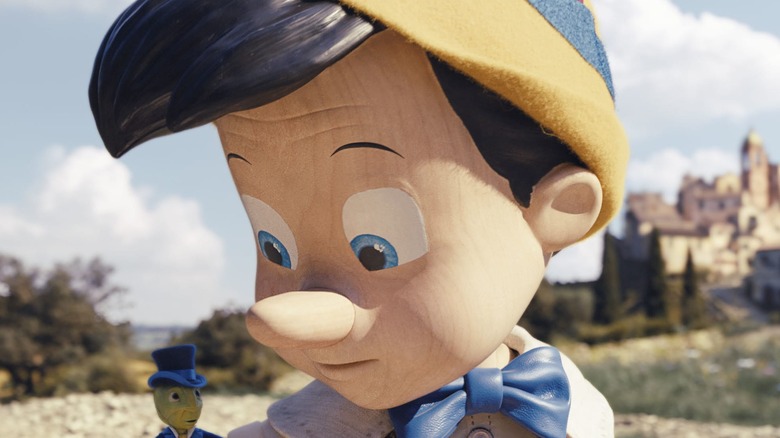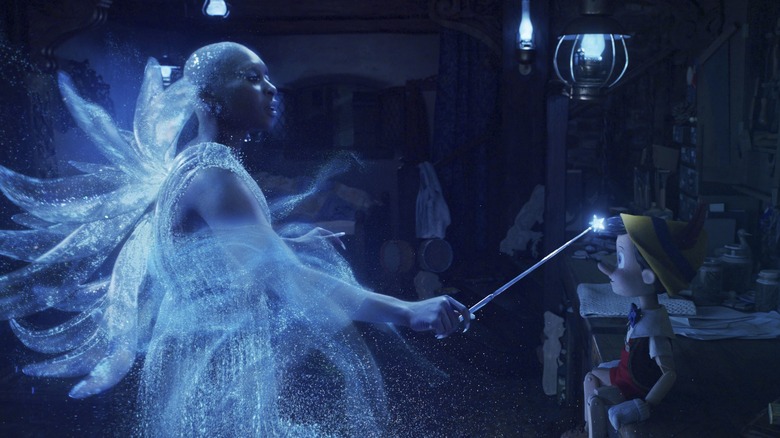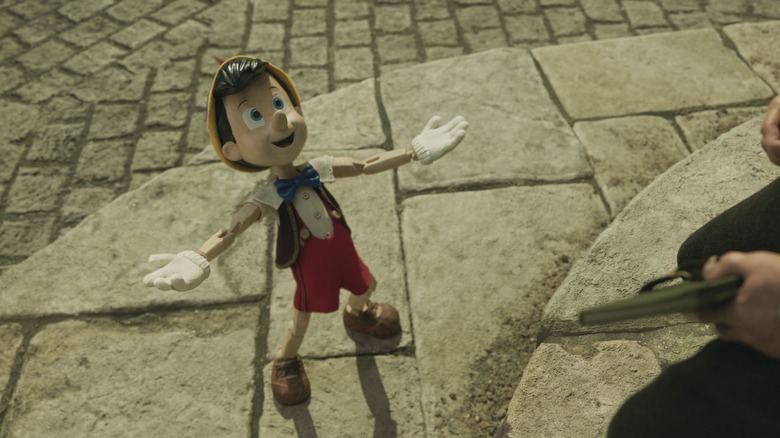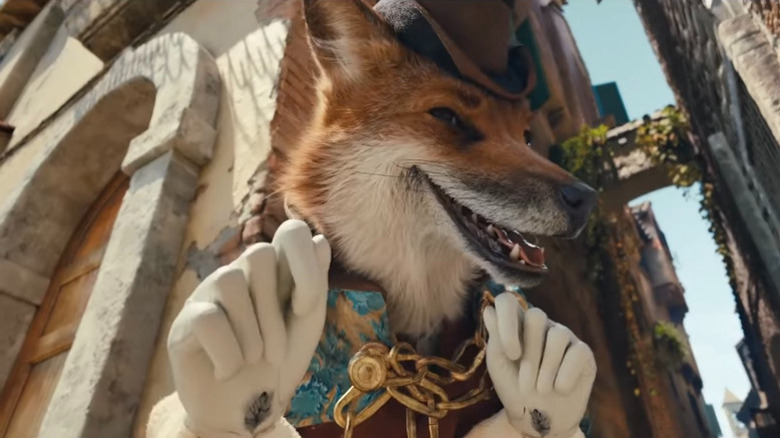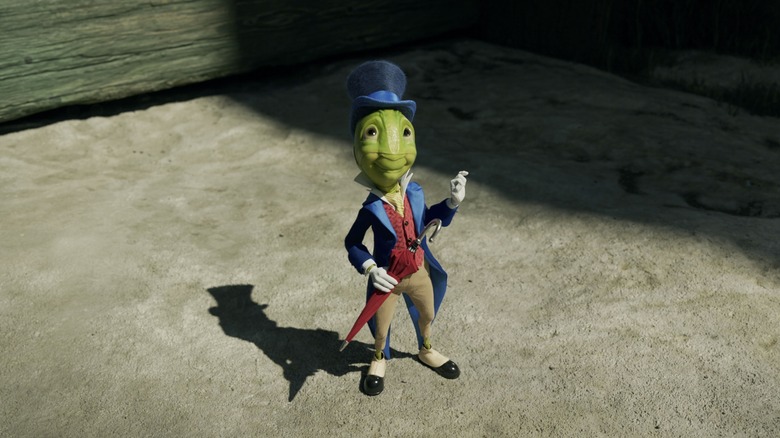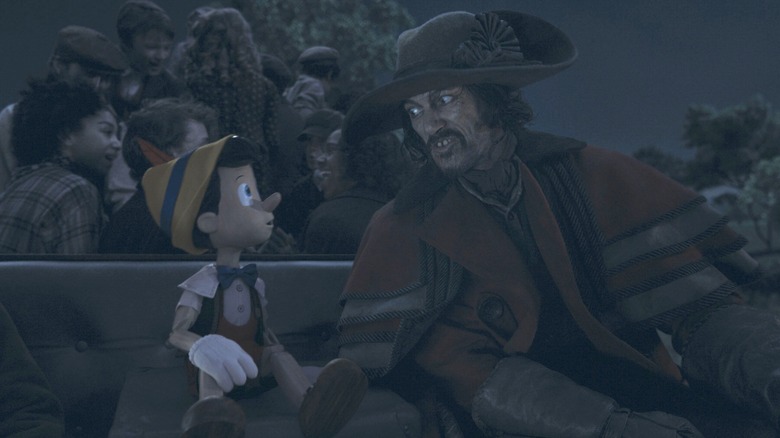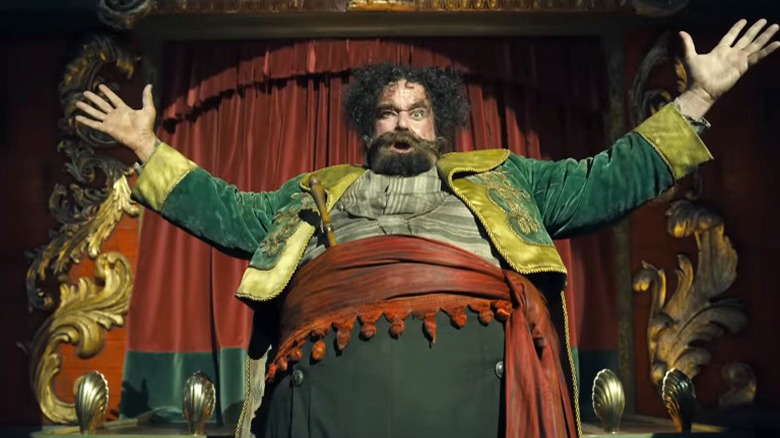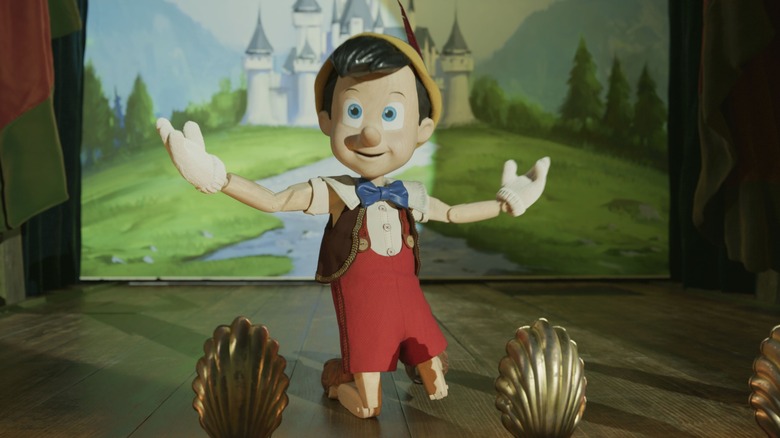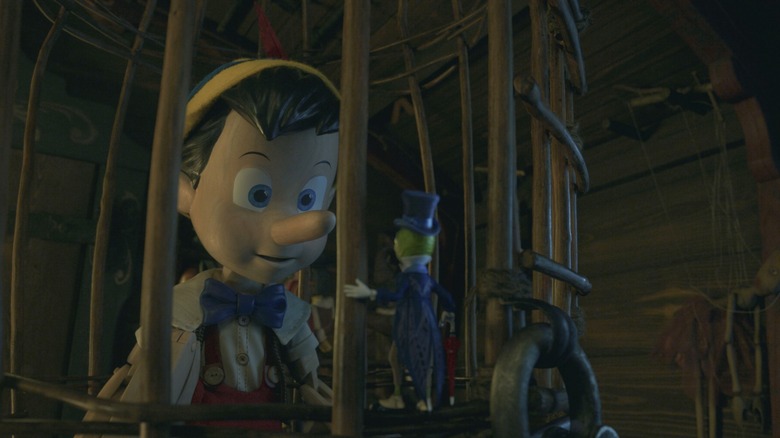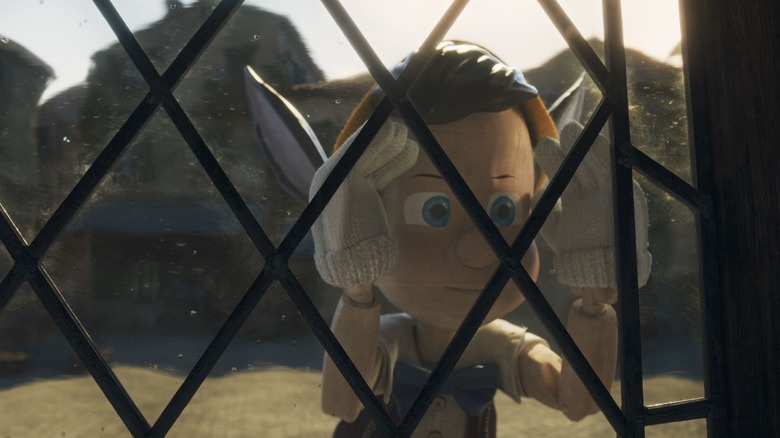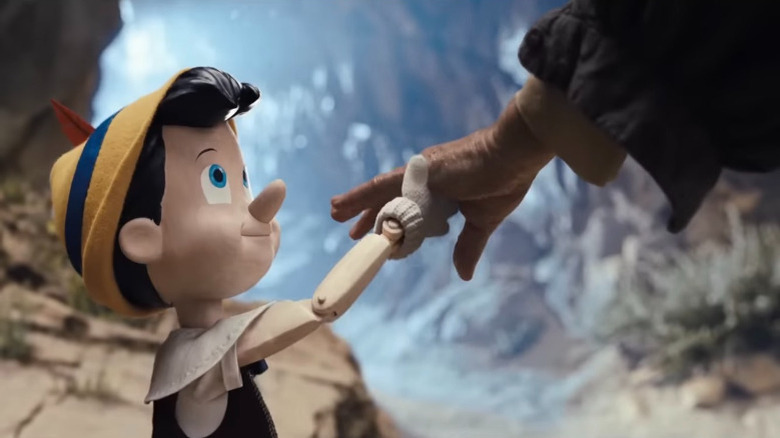The Ending Of Pinocchio Explained
In 1940, Disney released one of its earliest and most enduring masterpieces: "Pinocchio." It told the story of a lonely carpenter named Geppetto who longed for a family of his own. Instead of venturing out into the world to find the perfect partner with which to share his life, he uses his incredible talents to carve a boy out of a hunk of wood and name him Pinocchio. While he's pleased with the result, it just isn't the same as having a living, breathing son of his own. So, he makes a wish upon a star, catching the attention of the magical Blue Fairy. She arrives in the night and brings Geppetto's puppet to life. The journey that ensues is timeless, beautiful, and heartbreaking.
Over 80 years later, master filmmaker Robert Zemeckis ("Back to the Future") turned his attention to retelling the story for modern audiences. Instead of being entirely animated, this remake blends computer-generated images and live-action seamlessly, creating a world that is both fantastical and real to the eye, much like the titular character himself. While it stays very close to the original for much of its runtime, there are a few additions that change the overall impact of the story slightly.
This time, the journey is taken both without and within as Pinocchio has to learn from his own mistakes, adapt to new situations, and accept himself for who he is, rather than who he thinks his beloved father wants him to be. Here's a look at the ending of the new "Pinocchio" adaptation.
When you wish upon a star
The first act of a film should set up the core concepts that will be challenged in the second and resolved in the finale. Therefore, it's important to begin (for now) with the beginning. 2022's "Pinocchio" starts as you would imagine: Jiminy Cricket (voiced by Joseph Gordon-Levitt) arriving at the home of Geppetto (Tom Hanks) as he places the finishing touches on a puppet. Geppetto sings a sad song about how this puppet resembles the son who used to live with him, demonstrating the kind of hole existing in the lonely old man's heart.
Since he carved the puppet out of pine, he names him Pinocchio. In bed, Geppetto notices a star in the night sky. Wanting nothing more than to have a real son again, Geppetto makes a wish on that star that Pinocchio could be a living boy. As the song suggest will happen when wishing on a star, "anything your heart desires will come to you," so while Geppetto sleeps, the Blue Fairy (Cynthia Erivo) arrives and grants his wish.
Pinocchio (voiced by Benjamin Evan Ainsworth) comes to life but is concerned that he is not a "real" boy. The Blue Fairy assures him that once he proves himself to be brave, truthful, and unselfish he will be real. To help him find his way, she assigns Jiminy Cricket to be his temporary conscience. Wanting nothing more than to make his father happy, Pinocchio is fixated on becoming a "real" boy.
Imposter syndrome
Pinocchio is driven by the idea that he needs to be something he isn't. Every decision he makes is based on this feeling of insecurity. Why does he want to go to school? Well, that's what "real" boys do. Why does he agree to go away with Honest John (Keegan-Michael Key) and make it famous? All "real" boys want to be celebrities, don't they? It is very clear that poor little Pinocchio is suffering from imposter syndrome.
From the moment he walks out on Geppetto's front step, he is constantly being pulled in several different directions in the hopes of finding the best route to becoming a "real" boy. Therefore, he misses out on significant life lessons that are staring him right in his painted face like the fact that aspiring to be more than he is itself is a universal trait shared by all "real" people, or that his capacity for love is another part of his being that makes him "real."
Who can blame him for feeling like a fraud, though? When he goes to school, the teacher throws him out on the street proclaiming that school is for "real" kids, not puppets. When he dances at Stromboli's show, the entire gimmick is based on the idea of a puppet who doesn't need any strings. Even when he's given the chance to turn away from traveling to Pleasure Island and going home, he elects to stay because that's what he's told "real" kids would do.
Growing up isn't easy
Perhaps the most interesting aspect of Pinocchio's journey is just how similar it is to the one we all take on the way to adulthood. We're not all conned into working as slaves in a large man's traveling puppet show, partially transformed into donkeys, or swallowed by a sea monster so big it looks like an island, but we are tempted to take the easy road to fame and fortune, and we all make a lot of mistakes along the way.
Even though the majority of the film takes place in a single day (a fact that Geppetto points out is a tad unbelievable — despite the fact that he lives in a world with talking puppets and animals), Pinocchio does a lot of growing up during that time. In many ways, he begins the story as a newborn, imitating everyone around him until he can speak and stand on his own legs. Then, he enters adolescence, where he's starting to make friends and enemies. By the time he meets Sabina (Jaquita Ta'le), puberty is starting (hence his affection for her puppet).
His time on Pleasure Island can be seen as his high school years: He's drinking, playing pool, thumbing his nose at authority, and changing into a version of himself he doesn't like. Finally, when he reunites with Geppetto, he's graduating and entering the adult world. This is why the film ends when it does: Pinocchio has grown up.
Always let your conscience be your guide
The narrator of the story is a talking cricket by the name of Jiminy. He wanders into Geppetto's home after seeing that the lights were on and it turns out to have been one of the most important decisions of his life. Although it's never explicitly stated or delved into with any real detail, it's obvious by his tattered clothing and view of the world that Jiminy has been around the block a few times and has a pretty good sense of the nature of people and right from wrong. This is what makes him a perfect temporary conscience for Pinocchio.
Although he is more than qualified for the job of helping steer Pinocchio in the right direction, circumstances make it difficult for him to be there when he's needed most. He gets trapped in a jar by Honest John, almost run over by a wagon, and is constantly doing battle with the elements to stay by Pinocchio's side. Even though he isn't always there physically doesn't mean he hasn't left an impact on Pinocchio.
Had he not been there at all, Pinocchio wouldn't have had a chance at surviving the world outside of Geppetto's home. He would have followed Honest John without a second thought, worked for Stromboli forever, and never seen his father again. Luckily, Jiminy told him right from the beginning that not everyone is trustworthy and that's a lesson that sticks with Pinocchio to the end.
Giving into peer pressure
Pinocchio's darkest moment comes when he travels to Pleasure Island with a bunch of lost children. He gets swooped up by a speeding carriage as he steps out onto the street, just like all the other wayward youths. Based on what he's learned from Jiminy and his experiences up to this point, he's aware of the fact that something doesn't seem right about this Coachman (played by Luke Evans) and his promises to take him and others to the greatest place on earth, but he doesn't have the confidence yet to stand up for himself.
When the Coachman gives him the opportunity to stay or go, a song about how "real" kids want to live in a world without parents, where all of their whims can be indulged without fear of punishment convinces him to stay. A part of him knows that this is a mistake, but he buckles. At first, everything is just as magical and exciting as was promised, but that changes very quickly.
This was all a scheme to turn lost children into donkeys to be used at a salt mine. Shadowy, monstrous figures take them away by the boatload and almost take Pinocchio as well. Although he initially gives into peer pressure, his conscience (both Jiminy and the one he's been developing independently) wins out, and he flees to safety. From this point on, he won't be making the same mistakes again.
A real fake friend
Sabina is a singing, dancing, puppeteer working for Stromboli with dreams of having a show of her own. The only problem is that she's stuck working for this terrible man and she has a leg brace. Still, she doesn't let that stop her from performing. This is, of course, an obvious parallel to Pinocchio's own self-perceived shortcomings. The difference here is that Sabina won't let her leg or situation stop her forever. She's still capable of breaking out on her own — it's just going to take longer than expected. Basically, she knows there's nothing wrong with her where Pinocchio believes he needs to change.
Two of the people he's met thus far have abused him and lied to him, thus Pinocchio isn't too keen on trusting Sabina, who only wants to help him. However, when she communicates with him via a puppet, he is mesmerized. It's another example of what's real and fake being entirely a matter of perception.
Pinocchio (and practically everyone else he encounters in the film) is convinced he isn't "real," despite all the evidence to the contrary. The only reason he can trust Sabina's puppet is that she isn't "real" either. However, he's actually talking to Sabina, therefore he is trusting a human. This relationship is also important because he has a chance to give up everything to be with Sabina and her puppet, but he selflessly gives up that opportunity to save Geppetto.
Learning from your mistakes
After all the madness he's been through, Pinocchio comes to a point where he needs to make some pretty big decisions very quickly. The first involves whether or not to take Sabina up on her offer of running their own puppet show. She isn't asking him out of greed or malice, she genuinely believes this would be a good move for Pinocchio. It would allow him to be exactly who is and embrace what makes him special. Instead, he decides to ski across the ocean to reunite with his father.
This decision is a selfless one, as evidenced by the fact that the donkey ears and tail that had grown on Pleasure Island vanished. He then rides out to meet with Geppetto, and they both get swallowed by Monstro the sea monster. Once inside, he could sit there and feel bad for his situation, but he springs into action instead. While dancing for Stromboli, he moves so fast that the friction starts a fire. He does this again to set a fire that would cause enough smoke to make Monstro sneeze and send them flying back out to sea.
With nothing more than half a boat to keep them above water, Pinocchio then uses his legs to propel them to shore, with Monstro close behind them. These choices reflect the growth he's made as a character. He's no longer content with doing what others tell him, he is now being proactive.
Braver than your average boy
One of the traits Pinocchio has to demonstrate is bravery. In order to become a "real" boy, he needs to prove that he can pursue a goal in the face of fear, which is what bravery and courage are all about. When this incredible day began, he was a completely blank slate, he had no understanding of the dangers he could potentially face. So, you can't really call him brave for that because he has nothing to fear.
In fact, we don't really see him encounter fear in a palpable way until Stromboli locks him up in a cage and says that he will never go home again. Originally, Stromboli told him he could go home after performing for him, so he is hurt by the lie, angry at himself, and afraid of never seeing Geppetto again. While spending time on Pleasure Island, he is flat-out terrified for most of his stay. These are big, rowdy kids who like to fight, talk back, drink, and gamble. He's way out of his depth.
Then there's his escape from Monstro. A "real" boy would probably have a heart attack before thinking clearly enough to figure out a way out of the sea monster's belly. So, Pinocchio has proven his bravery time and time again. However, perhaps the bravest thing he's done is to save his father even though he thought there was a chance he may never accept him as "real."
A real tear
The line between what is and isn't real blurs more than ever in the final moments of the film. As already mentioned, Pinocchio uses his own ingenuity to escape from Monstro. Once he, Jiminy, Geppetto, Figaro (the cat), and Cleo (the goldfish) are back in the relative safety of the open sea, the only object they have to keep them from drowning is half a small boat. Once Monstro begins chasing them, Pinocchio acts quickly to beat his legs like a propeller, speeding them across the water and back to shore.
They crash on the beach and go flying. Everyone seems okay, except for Geppetto. He lays there with his lungs full of water, unable to breathe. Pinocchio believes with all his heart that his father is dead. Desperate to help, but without the means, Pinocchio starts to cry. An actual tear forms in one of his painted eyes and falls from his wooden face onto Geppetto's fleshy cheek, splashing with blue fairy dust.
This is the first sign that Pinocchio is becoming "real." Wood can't cry. You could argue that wood can't walk or speak either, but at no point in the movie prior to this did Pinocchio ever produce sweat or saliva or any bodily fluid. At this moment, he has proven himself to be "real" so convincingly that an honest-to-goodness tear was formed and it revived his father from the brink of death.
A genuine boy
We said back at the start of this that Pinocchio's transformation is every bit about looking within himself as it is about looking out to the world at large. This is made very clear in Geppetto's final speech to his son. When he's brought back to life, Geppetto is so amazed by what Pinocchio has done that he comments that no real boy could have ever done that. While he meant this as a compliment, Pinocchio sees it as further confirmation that he isn't what his father wants.
Finally, Geppetto tells Pinocchio what he needs to hear. He says that Pinocchio has tried with all his heart to become a real boy which makes him honest, brave, and truthful. He admits that he realizes now the mistake he made from the start. He should have never made Pinocchio believe think any less of himself because Pinocchio is perfect just the way he is.
Jiminy tells us that some people think Pinocchio literally transformed into a human, and the visuals hint at this being the case, but it's kept intentionally vague. Why? Because it doesn't matter. Geppetto accepts his son for who he is and that is actually all Pinocchio has ever wanted.
